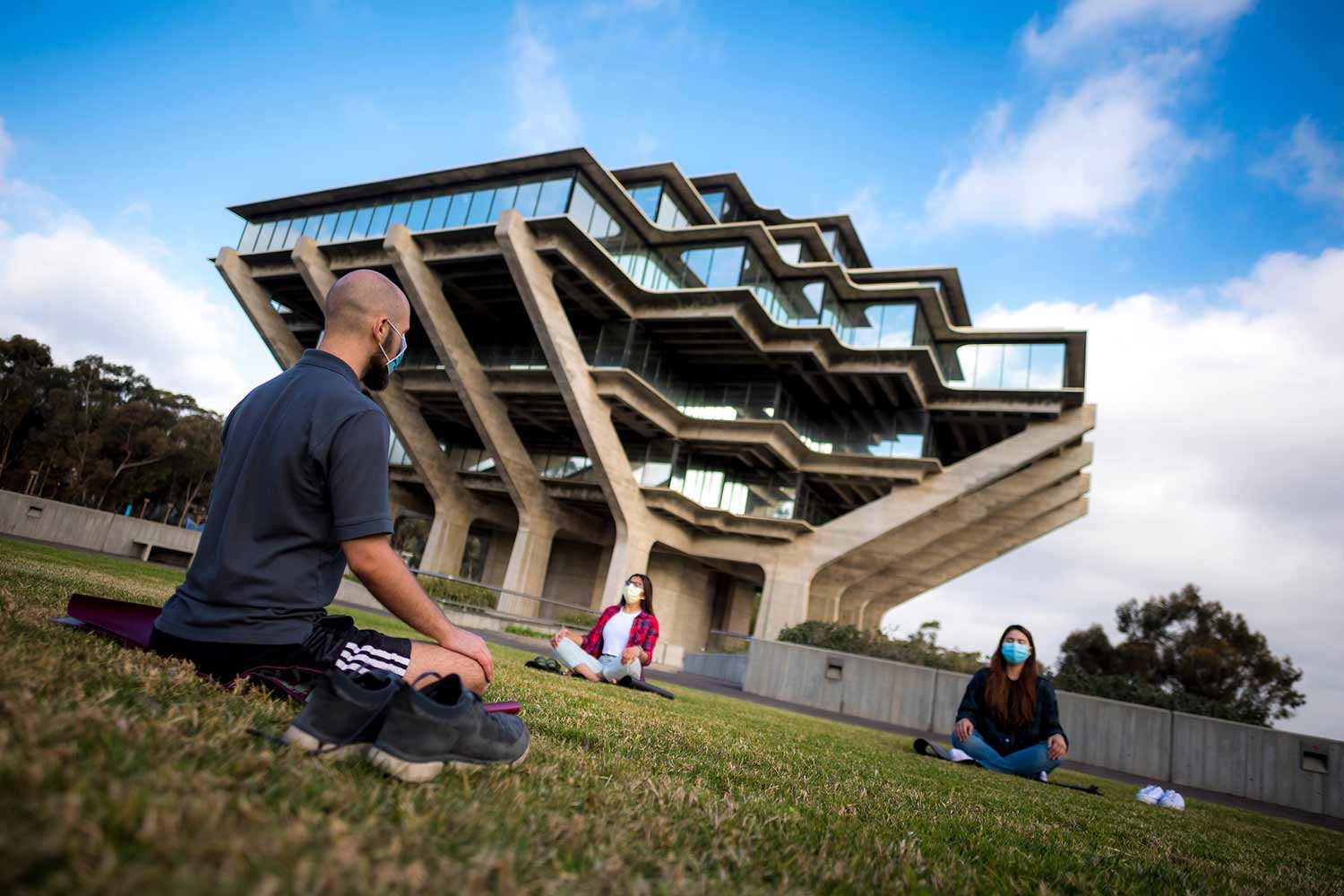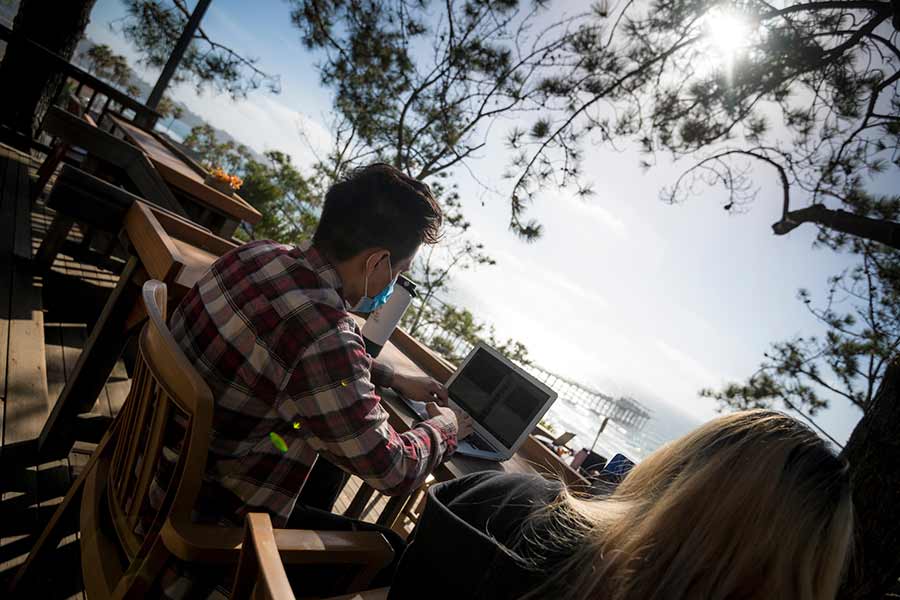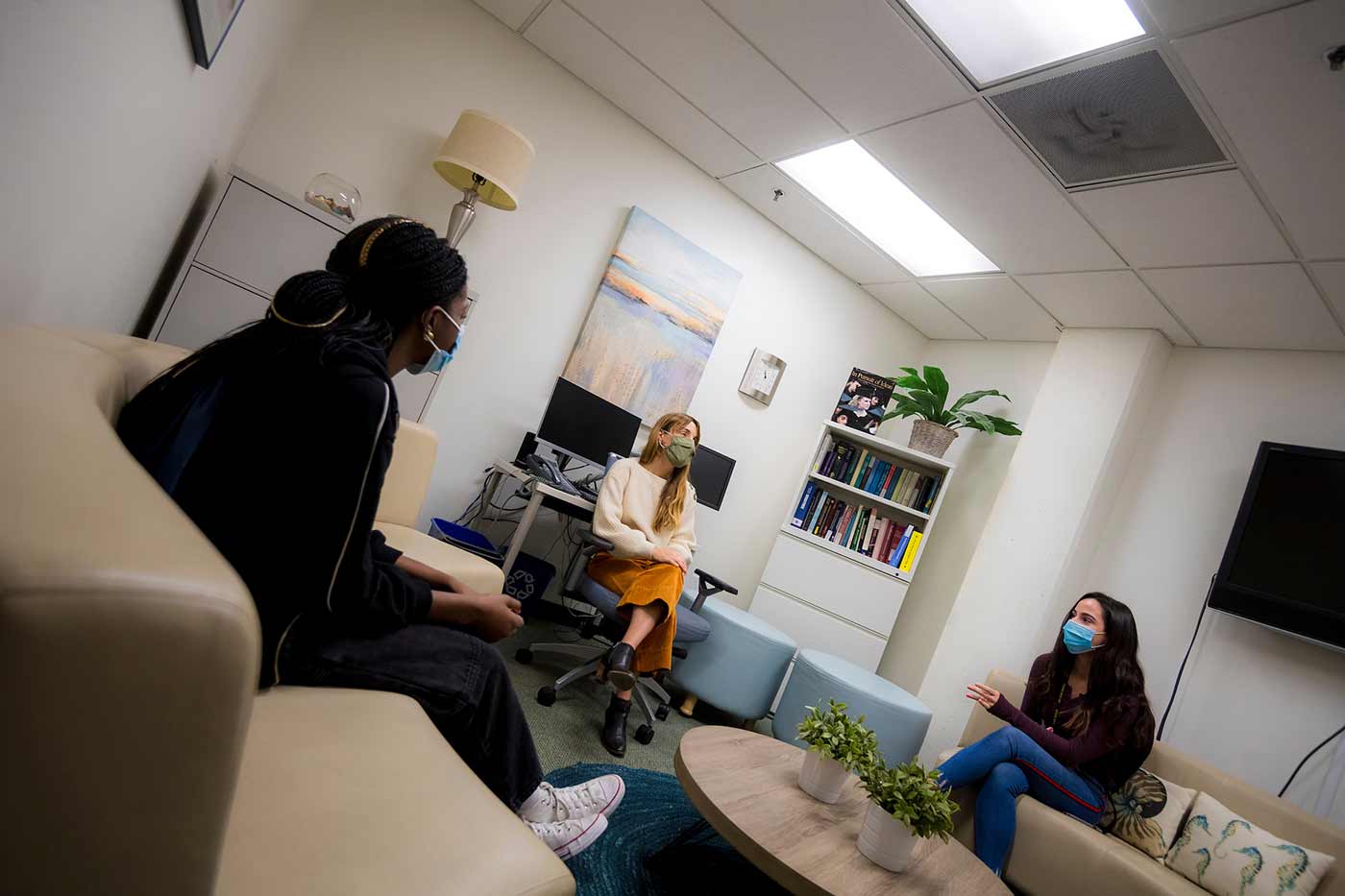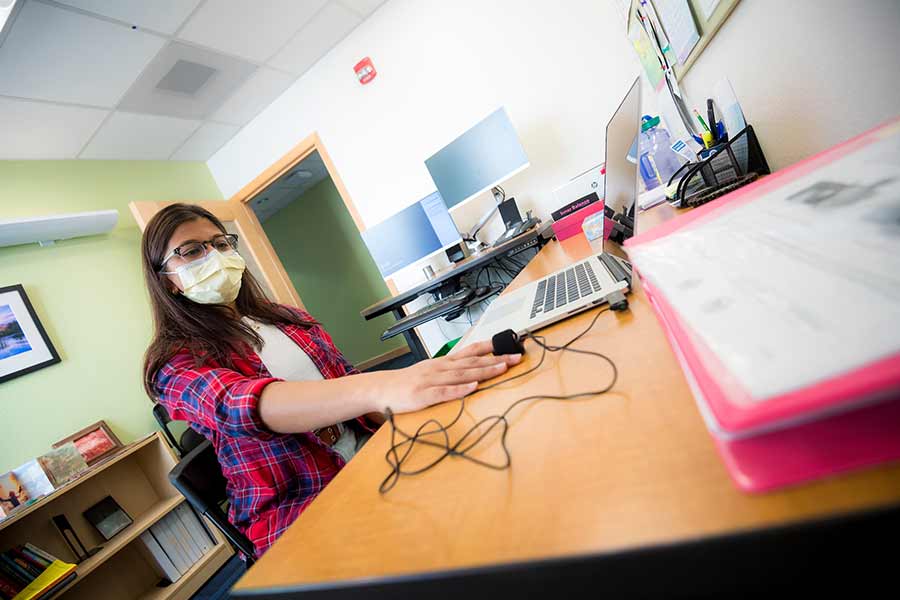By:
- Erika Johnson
Published Date
By:
- Erika Johnson
Share This:

Photos by Erik Jepsen/University Communications.
May You Be Well: New Ways to Build Resilience
Danielle Villa-Agustin has wondered if her life would be simpler without anxiety. In the past, she compared herself to peers, leading to feelings of self-doubt. Once she recognized that it was her choice whether to listen to the negative thoughts, she began to transform her life. Beginning in community college, Villa-Agustin started visiting the tutoring center, took initiative to gain an internship at the local city government office and transferred to UC San Diego where she is now studying cognitive science with a specialization in design and interaction.

A painting by Danielle Villa-Agustin, which represents the internal war between the warm strength of ambition and the cold weight of anxiety. Ultimately, it is ambition that wins.
“I slowly began to realize that I have the power to build my own definition of success,” explained Villa-Agustin. “I celebrate the small successes in life and weather the storm with poise and humility. This is ultimately what resilience means to me.”
May is Mental Health Awareness Month, a time to reflect on what each of us needs to care for our emotional wellness, acknowledge and support those who struggle with mental illness and unite to reduce the stigma around seeking counseling. Students and employees have access to a multitude of no-cost resources at UC San Diego to maintain wellness, including confidential counseling, self-guided tools, support groups, workshops and more. Whether you feel most comfortable with self-paced skill building, working one-on-one or finding community through support groups, there is a resource for everyone.
A monthlong series of workshops and resources has been organized by Student Health and Well-Being, which ranges from Finding Calm with Resilience to Burn Bright, Not Out—Support Forum for Graduate and Professional Students and Latinx/Chicanx Cafecito Hour. The workshops are led by Health Promotions Services (HPS), Counseling and Psychological Services (CAPS), and a variety of campus partners dedicated to student mental health and well-being. Some of the programs are co-facilitated by UC San Diego’s Peer Health Educators, who are dedicated to helping students live a healthy life.
Getting into the right headspace
Being sequestered in front of a computer for the past year has made it difficult to connect with others, especially for students who are starting their first quarter at UC San Diego. To foster friendships, Health Promotion Services has introduced Tritons Connecting Tritons, a new pen pal program open to all undergraduate and graduate students. Students who sign up by May 1 will be connected with another Triton who has similar interests or academic pathways. The “letters” can be sent via email or as a traditional handwritten correspondence through the mail.

Happiness stems from many sources, from sitting seaside with a friend to getting swept away in a daydream or listening to a calming meditation stream.
In addition to making connections, students can also learn how to cultivate resilience during times of turmoil. Health Promotion Services offers individual biofeedback appointments at no cost that are designed to identify unique sources of stress, develop coping strategies and promote relaxation. Through the monitoring technology, students can see their physiological response in real time and learn to control their emotions, returning to a state of peace and wellbeing.
For students seeking more self-paced relaxation resources, Counseling and Psychological Services (CAPS) is now offering a free subscription to the Headspace Plus application to registered students as part of the suite of iFlourish self-guided tools to help manage stress, anxiety, depression and more. Similarly, students are invited to tune in weekly to the Live Well, Be Well podcast where students cover all things wellness, from stress management and healthy relationships to how to bounce back from setbacks.
Add a counselor to your A-team
Speaking about your feelings, or even acknowledging them, can be a daunting task. When was the last time you sat quietly and truly focused on how you are feeling? Distractions and stressors often abound, leading our mind to pile up with worries, doubts, fears and frustrations until a mental check-up becomes necessary. That’s where counselors come in—they are your guide to the deep space that is your mind, helping to ground you when there seems to be no gravity.
Crystal Green, director of the Faculty and Staff Assistance Program (FSAP), believes everyone should add a counselor to their A-team, that core network of people in your life you can turn to for mentorship and advice. “Make a well visit,” she says. “We meet our physicians for the first time or interview a new hair stylist, why not do the same with a therapist? Schedule 30 minutes to say hello to an FSAP counselor, and if at some point you need to think through something, you already have a contact.”
Counseling through FSAP is both confidential and no-cost to employees. Appointments are not recorded in human resource files, and no reports are made to insurance companies; it’s a truly off-the grid conversation. And employees can speak about any topic they would like, both personal and professional.

Students are invited to take part in one of several group sessions with a clinician from CAPS, which are now available virtually. Photo captured prior to the pandemic.
“Maybe you lost your apartment, a family member passed away or you are struggling with addiction,” explained Green. “We are ready for anything—from an employee who just started yesterday or a professor who has been with the campus for 40 years. Our experienced, open-hearted counselors will meet you where you are at.”
Similarly, CAPS counseling services are available at no-cost to all registered students—no matter where they are in the world. Students who live outside of California in the U.S. can receive mental health support through a CAPS referral to a network counselor through their medical insurance provider. In addition, international students can now access counseling through My Student Support Program (MySSP) and receive live and real-time support in multiple languages, available 24 hours a day, seven days a week.
“International students often come from countries where mental health is not something that is openly spoken about, and we hope this resource will help change that,” said Rina Schul, a psychologist with CAPS who serves as liaison with the International Students and Programs Office.
For students who may not know what to expect, or hesitate to book a formal appointment, there are Let’s Talk sessions available. Similar to an office hour, students can meet casually with a counselor for up to 30 minutes for advice on general issues. They are designed to connect you with a psychologist and ask questions about your well-being, accessing resources and getting connected with CAPS.
You are not alone
The mind is rarely a placid lake. Currents of doubt pull you in multiple directions while worries cast ripples that can reverberate for days. There have been many sources of waves this past year, from political unrest to racial attacks and a global pandemic. It is important to remember—you don’t have to cope with these experiences alone.
Employees are invited to join in a support group with peers to share challenges and successes and unite in cultivating wellness. FSAP hosts support groups for working moms, elementary and middle school parents as well as caregivers. There are also lunchtime wellness lecture series and a monthly Tritons Flourish Group for those looking to flourish personally and professionally. “In our professionally facilitated support groups, our employees find it easy to learn communication and self-care skills as well as meet new friends with like interests,” explained Green.

Students can discover how they uniquely respond to stress and develop relaxation skills through a biofeedback appointment at Health Promotion Services.
Students also have a multitude of programming available through Tritons Flourish, which are free with no appointment needed. Daily drop-in workshops help students learn new skills to improve stress management—from reducing anxiety to improving sleep—as well as learn to cope with emotions such as loneliness and learn strategies to strengthen resilience and well-being. In addition, Community Forums offer identity-based and experience-based spaces for students to connect with peers and CAPS staff. These include the APIMEDA Community Forum, the Black Women’s Collective, the LGBTQ Community Forum, ADHD Support Forums, and Grief and Loss Support Forums.
For employees who prefer a class setting, FSAP counselors also lead numerous classes, which include topics such as “Workplace Bullying, Fear, and Building Trust;” “Perfectly Imperfect Motherhood: Pregnancy & Beyond;” “Mind-Body Skills for Busy Professionals;” and “Navigating Uncertainty and Managing Stress.”
Two new resources have also recently been published. A new webpage on grief and loss offers suggestions on how to navigate emotions and heal for those who have experienced loss, as well as guidance for those who seek to support another person who is grieving. Also, a newly compiled resource on managing stress and uncertainty is now available, with resources to support your mental and emotional wellbeing during challenging times.
Share This:
You May Also Like
Stay in the Know
Keep up with all the latest from UC San Diego. Subscribe to the newsletter today.



